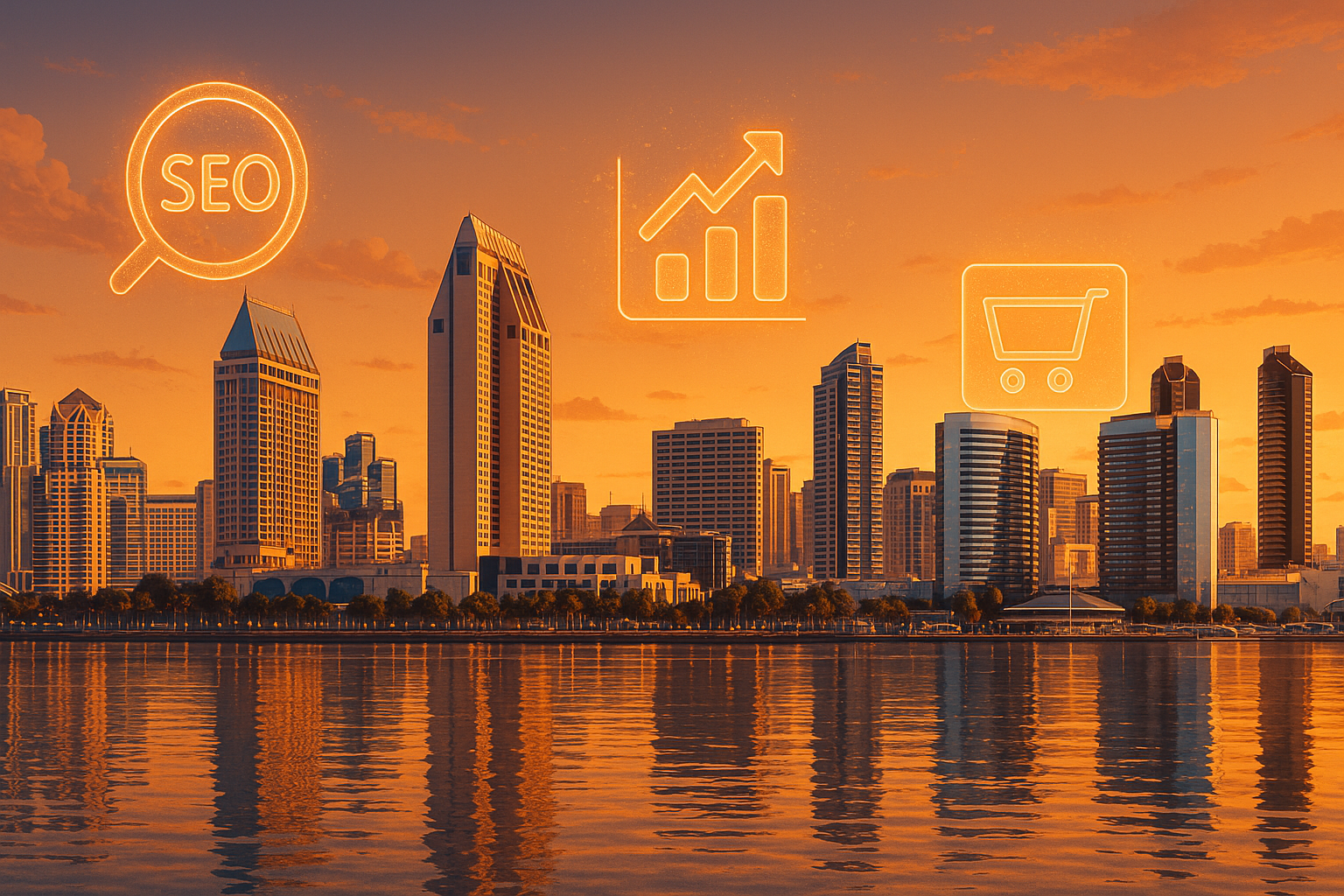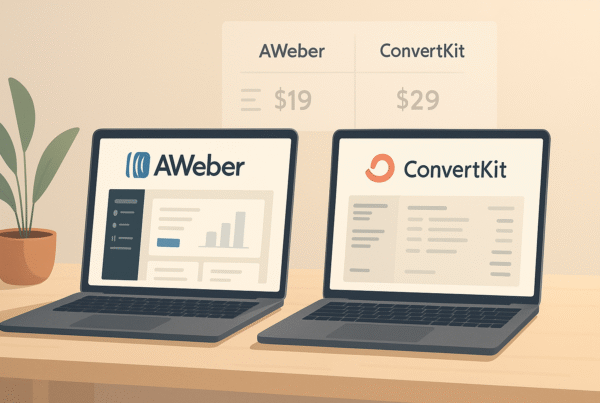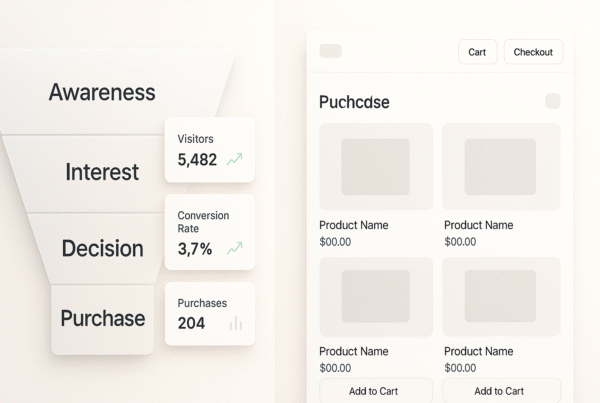Shopify SEO San Diego requires specialized tactics as your store competes with over 37 Shopify development companies currently operating in the area. These companies cater to businesses of all sizes, from small local shops to large enterprises. However, with such fierce competition, standing out in local search results requires a strategic approach, specifically tailored to the San Diego market.
San Diego’s Shopify development landscape is strong, with experts offering services ranging from SEO and backlink management to specialized solutions tailored to specific industries. Whether you’re working with professional Shopify website designers in San Diego or managing your store independently, understanding Shopify website costs in San Diego helps you make informed decisions about your e-commerce investment. Additionally, these companies focus on creating mobile-responsive designs that drive conversions and optimize performance. To compete effectively, you need a comprehensive Shopify SEO checklist that addresses local search engine optimization (SEO) factors.
Throughout this guide, you’ll discover eight proven Shopify SEO tactics to help your San Diego e-commerce store climb local search rankings. Consequently, implementing these strategies with the right Shopify SEO tools will position your business for greater visibility and success in the competitive San Diego market.
Optimize Your Google Business Profile

Your Google Business Profile serves as a digital storefront for your Shopify ecommerce business, especially when local customers search for products you offer. This is particularly crucial for Shopify SEO San Diego success. With approximately 40,000 Google searches conducted globally every second, and 46% of these searches driven by local intent, optimizing your profile is essential for achieving success with Shopify SEO in San Diego.
1. Why Google Business Profile matters for local SEO
For San Diego e-commerce stores, a Google Business Profile dramatically increases your chances of appearing in the coveted “Local Pack”, the three featured businesses that appear at the top of local search results. This prime digital real estate is invaluable, as about 50% of users who conduct a local search on their mobile device will visit a related business within 24 hours, with 78% of these searches leading to an offline purchase shortly afterward.
Furthermore, a well-optimized profile significantly impacts your local rankings through three key factors: relevance (how well you match what someone is searching for), distance (proximity to the searcher), and prominence (how well-known your business is). Unlike traditional SEO, local SEO through your Business Profile captures people with strong purchase intent who are ready to take immediate action.
Local SEO through Google Business Profile offers several advantages for your Shopify store:
- Increased visibility: Boost your position in search results by optimizing your profile, especially for the top three positions (known as the “snack pack”) that receive the highest traffic volume
- Higher credibility: A complete profile with positive reviews signals trustworthiness to both search engines and potential customers
- Better targeting: Connect with customers who are geographically close and ready to make purchases
2. How to set up and optimize your listing
Setting up your Google Business Profile requires attention to detail. First, claim your business at google.com/business with your professional email address. During verification, Google typically sends a postcard with a unique code to your physical address, though some enterprises qualify for phone verification.
To maximize your Shopify SEO San Diego effectiveness, ensure your profile includes:
- Accurate NAP information: Your business name, address, and phone number must be identical across all platforms to avoid penalties
- Detailed business category: Choose the most specific category for your industry from Google’s 4,000+ options to improve relevance for customer searches
- Comprehensive description: Utilize all 750 characters in your “from the business” section, highlighting what sets your San Diego store apart from competitors
- High-quality images: Businesses with more than 100 photos receive 520% more calls, 2,717% more direction requests, and 1,065% more website clicks than average businesses
Importantly, businesses with complete profiles are 70% more likely to attract visits from local searches. For maximum impact, keep your hours of operation up to date, including any special hours for holidays or events.
3. Tips for managing reviews and Q&A
Reviews wield substantial influence on your local SEO ranking; they’re considered the #1 factor affecting consumer buying decisions. One study panelist noted that “customers’ level of trust is indicated by reviews and an owner’s response, and trust is a fundamental element in determining rankings”.
To build a strong review profile for your Shopify store:
- Create a review shortcut link through your dashboard’s “Ask for Reviews” section to share with customers
- Request reviews from loyal customers first to build momentum, as 62% of customers will write a review if asked
- Respond professionally to all reviews, both positive and negative, showing that you value customer feedback
The Q&A section presents another valuable opportunity to engage with potential customers. Since anyone can both ask and answer questions about your business, proactive management is essential. Monitor this section regularly and consider these strategies:
- Seed your FAQ section by asking and answering common questions about your Shopify products
- Set up alerts to stay on top of new questions so you can respond quickly
- Upvote helpful answers to ensure the most accurate information appears prominently
By incorporating these Google Business Profile optimization techniques into your comprehensive Shopify SEO San Diego strategy, you’ll improve your visibility to local customers actively searching for the products you offer.
Use Local Keywords in Your Shopify Store
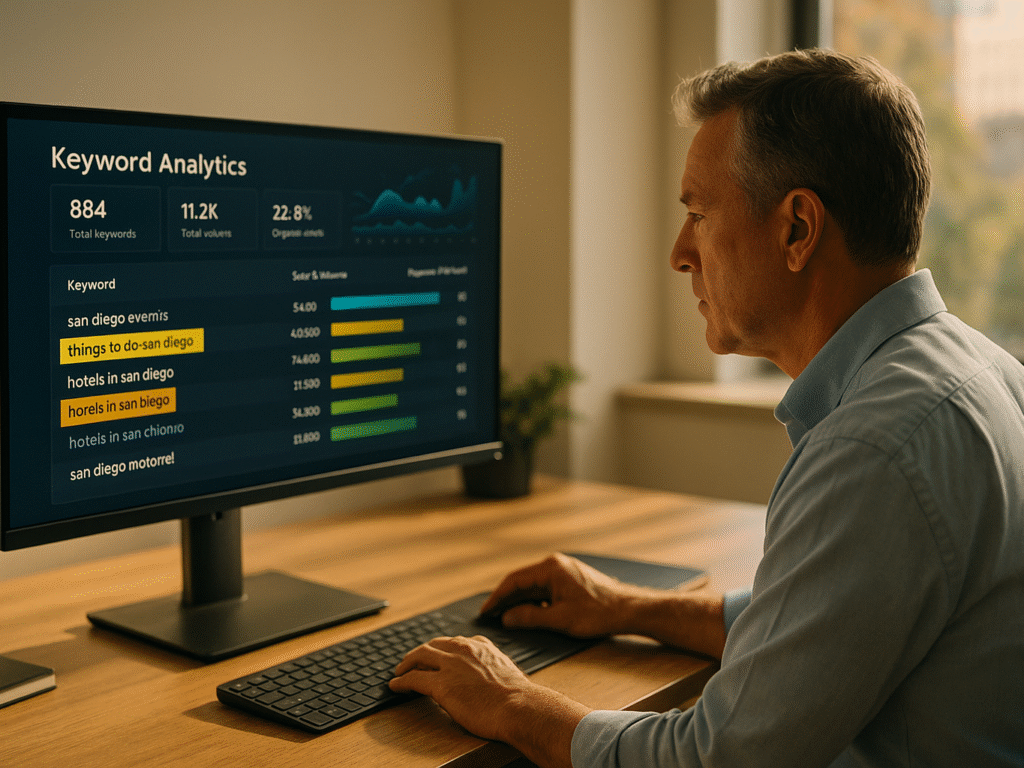
Local keywords form the backbone of effective Shopify SEO strategies in San Diego, helping your e-commerce store capture nearby customers who are actively searching for your products. With 46% of all Google searches having local intent, mastering local keyword implementation gives your store a significant advantage in the competitive San Diego market.
1. What are local keywords?
Local keywords are search phrases that include geographic terms, helping connect your Shopify store with customers in specific locations. These keywords typically fall into two categories: explicit and implicit.
Explicit local keywords directly mention location or use spatial terms like “near me.” For San Diego Shopify stores, these might include phrases such as “custom furniture in San Diego” or “organic skincare in San Diego”. These keywords indicate that users are seeking results from a specific geographic area.
Implicit local keywords, conversely, don’t mention location but still carry local intent. When someone searches simply for “coffee shop” or “boutique clothing store,” Google recognizes the likely local intent behind these queries. According to research, 22.6% of all web traffic comes from local searches, with mobile users being 35% more likely to visit a store after conducting a local search.
For your Shopify SEO San Diego strategy, consider three primary types of local searches:
- Non-geo-modified searches (broader terms like “kitchen accessories”)
- Geo-modified searches (location-specific terms like “kitchen accessories in San Diego”)
- Near-me searches (proximity-based terms like “kitchen accessories near me”)
2. Where to place them on your site
Strategically placing local keywords throughout your Shopify store maximizes their impact on your local rankings. Initially, focus on incorporating these terms in these key locations:
- Page titles and meta descriptions: Include your primary local keywords in these critical SEO elements, as they’re among the first things search engines evaluate
- Product titles and descriptions: Rather than listing a generic “Handcrafted Cutting Board,” enhance it to “Handcrafted Cutting Board in San Diego, Locally Made.”
- URLs: When possible, incorporate location terms in your page URLs for additional SEO value
- Collection pages: Optimize category titles with local terms (e.g., “Specialty Coffees in San Diego, Artisan Blends”)
- Alt text for images: Add local descriptors to image alt tags to improve local relevance
- H1 tags and subheadings: Include geo-specific terms in your primary headers
Remember to incorporate these keywords naturally; keyword stuffing can harm your rankings. Your goal is to include local keywords in a way that sounds natural, as if you were talking to a friend or colleague.
3. Tools to find local keyword opportunities
Finding the right local keywords requires specialized research tools that are designed for geographic relevance. To enhance your Shopify SEO San Diego tools arsenal, consider these options:
Google’s native tools provide excellent starting points for local keyword research:
- Google Keyword Planner allows you to input seed terms and discover related keywords with local search volumes.
- Google Autocomplete reveals commonly searched phrases when you begin typing. Try adding “San Diego” to see local suggestions.
- “People also ask” and “Related searches” sections at the bottom of search results offer additional keyword ideas.
Specialized SEO tools offer more comprehensive data:
- Semrush’s Keyword Magic Tool contains extensive databases of local terms and can filter for keywords that trigger local packs in search results.
- Ahrefs helps identify what local keywords your San Diego competitors are ranking for
- Moz Keyword Explorer provides difficulty scores to help prioritize winnable terms.
To determine keyword value, look for terms with a balance between search volume and competition. The ideal keywords connect with what your customers are searching for while remaining realistic to rank for.
Additionally, monitor social media discussions in local San Diego forums, Facebook groups, and platforms like Reddit to identify regional language differences and location-specific terminology that may not be captured in traditional keyword tools.
Create Location-Specific Landing Pages
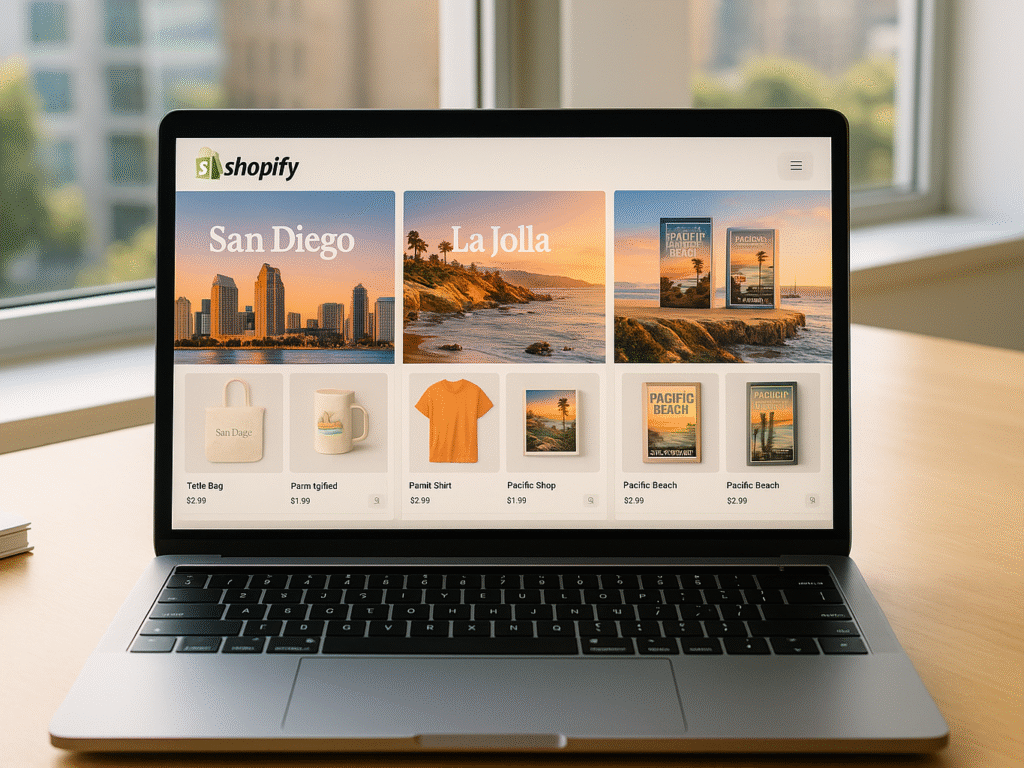
Location-specific landing pages serve as powerful tools for your Shopify SEO San Diego strategy. Creating dedicated pages for San Diego locations helps your e-commerce business establish stronger connections with local customers. Eighteen percent of local smartphone searches result in a purchase within a day, compared to just 7% of non-local searches.
1. Why location pages help with local SEO
Location pages dramatically improve your visibility in local search results by providing search engines with detailed information about where your business operates. These pages carry more authority for both implicit searches (such as “handmade jewelry” from someone in San Diego) and explicit searches (like “custom t-shirts in San Diego, CA”).
Location landing pages offer several key advantages:
- They help search engines understand your physical presence in San Diego
- They improve your chances of appearing in local three-pack results
- They provide valuable information directly to customers, like operating hours, address, and contact details
- They drive foot traffic that leads to sales
- They build trust with local audiences through location-specific content
Research indicates half of the customers who search for a store on their smartphone will visit that store on the same day. Moreover, location pages make tracking and optimizing your local marketing performance easier, ensuring long-term success.
2. Best practices for San Diego-specific pages
For maximum effectiveness, your Shopify location pages should include:
- Unique headlines and subheadlines that incorporate both your location and main keywords (e.g., “Artisan Jewelry Shop in North Park, San Diego”). When planning your location pages, consider how your overall Shopify website cost in San Diego impacts your ability to create multiple high-quality landing pages.
- Streamlined URL structure that’s easy to understand, such as yourshopifystore.com/san-diego/ instead of complicated strings of numbers or codes
- Consistent NAP information (Name, Address, Phone) that matches exactly across all platforms, even slight variations, can impact rankings.
- Embedded Google Maps allows users to see your location and better understand how to reach your store.
- San Diego-specific content mentioning local landmarks, surrounding neighborhoods, and community connections
- Structured data markup to help search engines understand your local business information
Importantly, your location page should predominantly consist of information that applies specifically to that location. The goal is to make it easier for customers to find you and the information they need to visit or make a purchase.
3. Avoiding duplicate content issues
One critical mistake many Shopify store owners make is creating multiple location pages with nearly identical content. When two pages are 99% similar, with only the city name swapped out, search engines may not recognize them as distinct and may rank only one of them.
To avoid this issue:
First, ensure each location page contains truly unique content. Aim to make more than half of the page content specific to that San Diego location. According to Google’s John Mueller, location pages with duplicate content can be considered doorway pages, which violate Google’s guidelines.
Second, incorporate location-specific elements like:
- Mention nearby San Diego landmarks and streets
- Pay homage to local San Diego organizations or partners
- Include testimonials specifically from San Diego customers
- Add photos from employees or jobs in San Diego neighborhoods
Finally, utilize Shopify’s personalization features to show different versions of the same page to visitors from various locations. It allows you to maintain consistent general information while adjusting specific products, content, and links according to the visitor’s location.
Remember that localized duplication is acceptable only when it serves the purpose of delivering a seamless experience. Service area pages, city landing pages, and local articles should always contain fresh, unique content.
Shopify Store Development Cost in San Diego 2025: From DIY to Pro Design: Planning to build or redesign your San Diego Shopify store? Understanding development costs helps you budget effectively and choose the most suitable approach for achieving your business goals. From DIY solutions to professional designs, discover what investment level delivers the best ROI for your local e-commerce success. Click here to explore your options.
Build Local Backlinks and Directories

Beyond on-site optimization, building a strong network of local backlinks serves as a cornerstone for successful Shopify SEO San Diego strategies. For e-commerce stores, these geographical connections create powerful signals that boost visibility precisely where it matters most: in front of local shoppers.
1. What are local backlinks?
Local backlinks function as digital endorsements from websites in your immediate geographic area. These valuable links act as personal recommendations within your community, elevating your presence in local search results. Think of them as online handshakes from neighboring businesses that signal to search engines your store deserves attention in San Diego-specific searches.
Unlike generic backlinks, local ones carry added relevance because they create connections within your specific business ecosystem. They serve dual purposes, improving your website’s search rankings and strengthening community ties. Research indicates that quality local backlinks not only enhance visibility but also amplify trust with both search engines and your target audience.
Local backlinks primarily work by:
- Signaling geographic relevance to search engines
- Building community-based credibility and trust
- Increasing referral traffic from nearby sources
- Establishing your brand as a local authority
These location-specific connections help search engines understand where your business operates, making them crucial for appearing in “near me” searches and San Diego-specific queries.
2. Top San Diego directories to list your store
Regarding directory listings, prioritizing quality over quantity yields better results for your Shopify SEO checklist. According to research, 94% of consumers consulted a business directory at least once in the past year to learn about new companies. Begin with these essential San Diego listings:
- Google Business Profile: The foundation of local directory strategy, offering multiple backlink opportunities beyond just your primary website address
- San Diego Business Chamber: A respected local organization providing valuable local authority
- San Diego City Business Tax Directory: Official city resources carry high trust signals
- What’s Your Hours San Diego: A free listing service specific to the San Diego area
- Local industry-specific directories: Seek out San Diego directories related to your particular product niche.
Whenever submitting your information, maintain consistent NAP (Name, Address, Phone) details across all platforms; inconsistencies can harm your local rankings. Afterward, verify your business profiles whenever possible to maximize credibility.
3. How to earn backlinks from local blogs and media
Throughout San Diego, numerous opportunities exist to secure valuable backlinks from local publications, blogs, and media outlets. These sources often carry more weight than generic directories because they represent editorial endorsements rather than simple listings.
To acquire these powerful backlinks:
Partner with local influencers: Identify key decision-makers in the San Diego community whose audiences align with your store’s offerings. Collaborating with local personalities creates mutually beneficial relationships that often lead to natural link placements.
Create newsworthy events by sponsoring local teams, hosting charity fundraisers, or organizing community workshops to make a positive impact. These activities generate natural press coverage, additionally building brand awareness while securing quality backlinks. Working with experienced Shopify website designers in San Diego can help you create compelling event pages and press materials that local media outlets want to feature and link to.
Develop local-focused content: Create resources specifically relevant to San Diego shoppers. It might include gift guides for local holidays, shopping maps, or neighborhood-specific product collections that local publications want to share.
Pitch local media effectively: When reaching out to San Diego publications, focus on what makes your story relevant to their readers. Include all necessary information, compelling images, and quotes to make the journalist’s job easier.
Monitor brand mentions: Utilize Shopify SEO tools to track instances where local websites mention your brand without providing a link back to your website. These represent simple opportunities to request link additions through friendly outreach.
Remember that local link building goes beyond SEO benefits; it creates genuine connections within your community. Utilize Shopify SEO tools to monitor these local connections and their impact on your rankings.
Add Structured Data for Local SEO
For stores focused on Shopify SEO San Diego success, structured data serves as the technical foundation that powers enhanced search appearances. This behind-the-scenes code helps your e-commerce business stand out in local searches by providing search engines with precise information about your business.
1. What is structured data?
Structured data functions as a standardized machine-readable format that helps search engines better understand your website’s content. This specialized code acts as a translator between your Shopify store and search engines, such as Google, clearly communicating critical business information.
At its core, structured data uses Schema.org vocabulary to mark up meaningful elements on your web pages. These code snippets inform search engines precisely what your content means, whether it’s a product, business information, or service details, enabling them to analyze and categorize your pages accurately.
For local SEO purposes, structured data offers several key benefits:
- Enhanced visibility in local search results
- Improved accuracy of business information across search platforms
- Potential for eye-catching, rich results that increase click-through rates
- Better interpretation by voice search assistants like Siri and Alexa
As part of your strategy, implementing structured data with the help of Shopify SEO tools specifically helps your San Diego store appear more prominently in location-based queries and “near me” searches.
2. How to implement a local business schema on Shopify
The LocalBusiness schema markup represents the most valuable structured data type for San Diego Shopify stores with physical locations. This specific schema helps search engines understand essential details about your business, including your address, phone number, hours of operation, and the services you offer.
To implement the LocalBusiness schema on your Shopify store:
- Please choose the correct format: Google officially recommends JSON-LD as the preferred structured data format because it’s easier to implement and maintain than alternatives like Microdata or RDFa. JSON-LD is embedded in a <script> tag, typically in the <head> section of the HTML document.
- Select the most specific business type: Use the most particular LocalBusiness subtype available for your store (Restaurant, DaySpa, etc.). If your business offers multiple services, specify them as an array.
- Add required properties: At minimum, include:
- Name: Your business name
- Address: Complete postal address with street, city (San Diego), region, postal code, and country
- Include recommended properties:
- Geo coordinates (latitude/longitude with at least five decimal places precision)
- Opening hours specification
- Telephone number
- Website URL
- Business logo and image
For Shopify stores, you have two implementation options:
Option 1: Utilize dedicated Shopify SEO tools like Schema Plus for SEO or JSON-LD for SEO, which automatically generate and manage structured data.
Option 2: Manually add the code by editing your theme files. Navigate to Online Store > Themes > Actions > Edit Code, then add your JSON-LD script to the theme.liquid file before the closing </head> tag.
3. Tools to validate your schema markup
Before publishing your structured data, validation is essential to ensure search engines can correctly interpret your markup. Several reliable tools help identify and fix potential issues:
Google’s Rich Results Test serves as the official tool for verifying if your structured data qualifies for rich results in Google search. This tool previews how your business information might appear in search results and identifies any critical errors that may occur.
Schema Markup Validator (SMV) replaced Google’s Structured Data Testing Tool in 2021. It validates all the schemas. Org-based structured data without Google feature-specific warnings, making it ideal for comprehensive testing.
Google Search Console provides ongoing monitoring through enhancement reports that highlight pages with structured data errors or warnings. This tool offers the additional benefit of tracking how your structured data performs over time.
The validation process typically involves:
- Paste your code or URL into the testing tool
- Running the test to identify errors (shown in red) and warnings
- Correcting any issues in the code
- Re-testing until no errors appear
- Implementing the validated code on your website
Following validation, use Google Search Console’s URL Inspection tool to request indexing of your pages with the new structured data. It accelerates Google’s recognition of your updated schema, potentially leading to faster eligibility for rich results.
Adding structured data to your Shopify SEO strategy provides search engines with clarity about your business location and offerings, ultimately enhancing your visibility to local customers searching for products you offer.
San Diego Shopify Fulfillment Guide: When to Use Contract Warehousing (2025): As your San Diego Shopify store expands, fulfillment becomes increasingly crucial for both customer satisfaction and operational efficiency. Learn when contract warehousing is a suitable fit for your business and how it impacts your local SEO strategy. Smart fulfillment decisions can significantly improve your delivery times and customer satisfaction ratings. Discover the right fulfillment strategy for your store.
Encourage and Manage Customer Reviews
Customer reviews function as powerful trust signals for your Shopify store, directly influencing your position in local search results. Given that 94% of consumers have stopped trusting advertisements, collecting genuine customer feedback becomes crucial for your Shopify SEO strategy in San Diego.
1. Why reviews impact local rankings
Reviews serve as critical ranking factors for local SEO, accounting for approximately 15% of Google’s local search ranking factors. Businesses appearing in the top three positions for Google Maps typically maintain an average rating of 4.1 stars.
The impact of reviews extends beyond star ratings. Review recency, volume, and velocity, all signals that indicate to search engines your business remains relevant and active. Furthermore, customers often mention specific products or services in their reviews, naturally incorporating high-volume search terms that boost your visibility.
2. How to collect reviews on Shopify
After purchases, Shopify automatically sends customers notifications requesting reviews. To maximize response rates:
- Simplify the process and make leaving reviews effortless by providing direct links in follow-up emails or generating QR codes for quick access.
- Time your requests strategically, send review requests 3-5 days after delivery, giving customers enough time to experience your products.
- Personalize your outreach, use the customer’s name, and reference specific products they purchased
- Consider offering gentle incentives, such as small perks like discount codes for verified reviews, as 89% of consumers are more likely to patronize businesses that engage with reviews.
3. Responding to reviews effectively
Promptly addressing both positive and negative feedback demonstrates attentiveness and builds trust with potential customers. In reality, 53% of customers who leave negative reviews expect a response within one week.
For positive reviews:
- Thank customers by name
- Reference the specific details mentioned.
- Reinforce positive aspects of their experience.
For negative reviews:
- Acknowledge concerns without getting defensive
- Apologize sincerely if your business is at fault
- Outline the steps you’re taking to resolve issues
- Invite further communication offline for sensitive matters
Remember that even occasional negative reviews enhance credibility; businesses with perfect 5-star ratings often appear less trustworthy than those with more realistic 4.7-4.8 ratings.
Optimize for Mobile and Local Search Intent
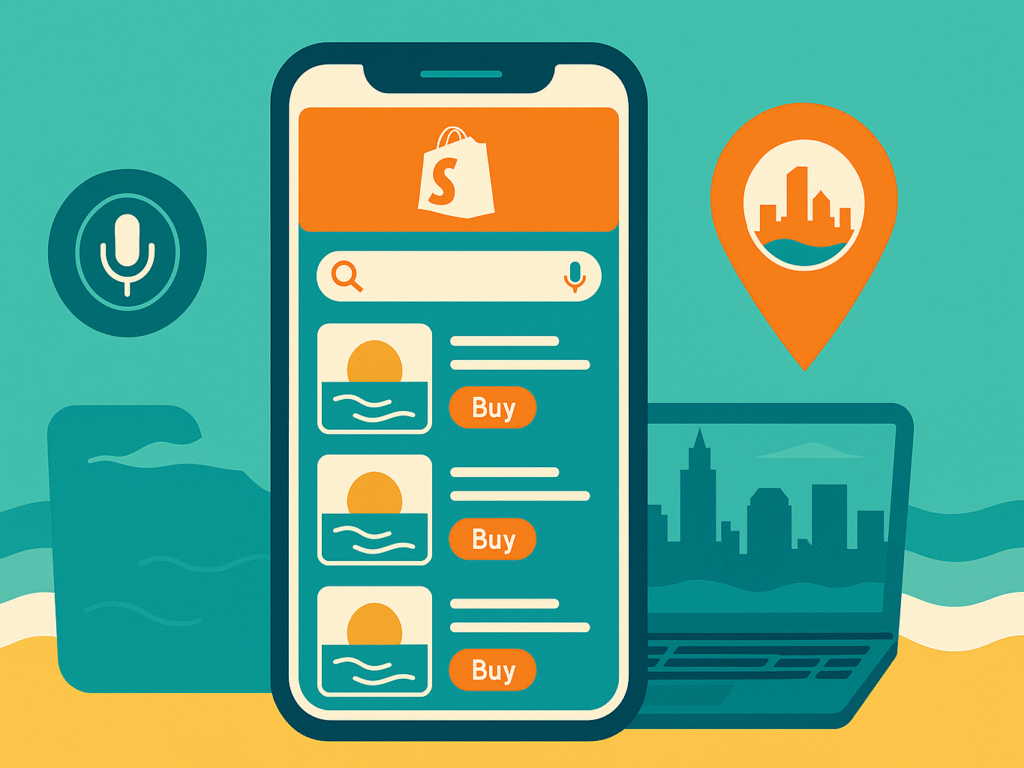
With mobile devices generating nearly 60% of all web traffic, optimizing your Shopify store for mobile users searching locally is no longer optional; it’s essential for your San Diego e-commerce business.
1. Mobile-first indexing and local SEO
Google now primarily uses the mobile version of your site for indexing and ranking. This approach, called mobile-first indexing, has been Google’s policy since 2017. Local searches particularly benefit from mobile optimization because smartphones provide more accurate location information than desktop computers.
Mobile users often exhibit different search behaviors, notably that 50% use voice search. These voice searches tend to be more conversational, making it vital to include natural-sounding long-tail keywords that address questions local shoppers might ask about your products.
2. Improving mobile UX for local shoppers
Mobile shoppers expect speed and simplicity. Every second counts; visitor abandonment rates increase by 32% when page load time extends from one to three seconds. As your San Diego store grows and mobile traffic increases, consider contract warehousing solutions to ensure fast local delivery times that keep mobile customers satisfied. To enhance the mobile experience:
- Ensure content is concise and readable with appropriate font sizes
- Optimize images specifically for mobile viewing
- Create thumb-friendly navigation for one-handed browsing
- Prioritize responsive design that adapts to different screen sizes
Keep in mind that mobile users tend to make faster decisions than desktop shoppers. Hence, your product information and calls to action must be immediately visible and compelling.
3. Using click-to-call and map integrations
Approximately 35% of store locator searches occur on mobile devices. Naturally, these searchers expect immediate action options. Implementing the right Shopify fulfillment apps for San Diego stores ensures you can deliver on the promises made through your mobile-optimized store locator.
- Prominently placed click-to-call buttons that allow customers to contact you with a single tap.
- Store hours that are easily visible without scrolling
- Integrated map functions that leverage native Apple or Google Maps
These integrations create seamless transitions from searching to purchasing. Indeed, many customers search locally with immediate intent; they’re ready to visit or buy from your San Diego store right away.
Your mobile optimization strategy should include regular testing using Shopify SEO tools for mobile usability. Ultimately, a mobile-optimized site not only improves your rankings but also delivers the frictionless experience today’s San Diego shoppers demand.
Use Shopify SEO Tools to Track Local Performance
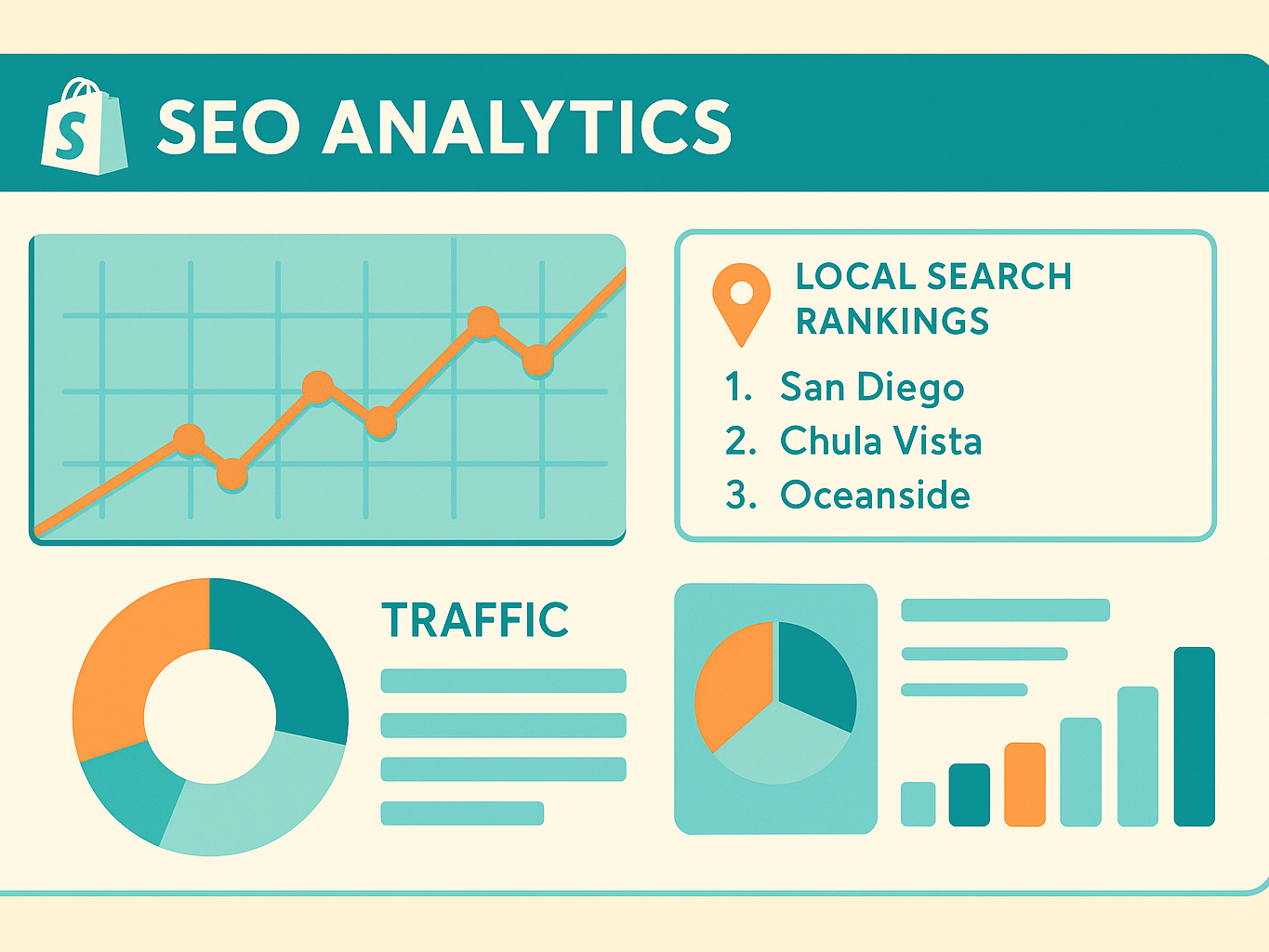
Tracking your local SEO performance with specialized Shopify SEO tools allows you to measure the impact of your optimization efforts and make data-driven decisions. For San Diego Shopify stores, understanding your visibility in local search results provides crucial insights into the effectiveness of your digital marketing.
1. Top Shopify SEO tools for local tracking
Free tools offer substantial value for monitoring your local performance. Google Search Console provides detailed insights into your website’s search visibility, measuring user queries, popular pages, links, impressions, and visitor geography, all of which illuminate how your website ranks in search results. Similarly, Google Analytics provides critical metrics about site visitors, including new and returning visitors, bounce rates, page views per session, conversion rates, and average time spent on site.
For Shopify stores that require specialized local tracking, BrightLocal’s platform includes features specifically designed for local SEO improvement, offering tools such as Google Business Profile audits, a local search grid, and local search results checkers to monitor your rankings.
Additionally, SearchPie combines features that focus on improving local search visibility while increasing site loading speed. When evaluating these tools, consider how they integrate with your existing setup and whether you need additional Shopify fulfillment apps to complete your local e-commerce strategy in San Diego.
2. Setting up local rank tracking
Creating a rank tracking report requires several key steps. First, select the location you want to track and determine your reporting frequency: ad hoc, weekly, or monthly. Next, add the specific keywords you want to monitor, selecting relevant search engines for tracking. For best results, run reports during your business hours to capture the most accurate data.
When tracking local rankings, avoid monitoring broad keywords without local intent. Instead, focus on location-specific keywords relevant to your service area. Furthermore, track both mobile and desktop rankings separately, as results often differ significantly between platforms.
3. Using data to refine your strategy
Effective use of tracking data involves identifying patterns and making strategic adjustments. Monitor essential metrics like:
- Keyword rankings for particular search terms
- Traffic sources showing how users find your store
- Engagement metrics revealing active user interaction
- Conversion rates tracking desired customer actions
These insights enable you to identify underperforming areas, allocate marketing resources effectively, benchmark against competitors, and measure the impact of your SEO efforts. Ultimately, this data-driven approach ensures your Shopify SEO San Diego strategy continually evolves and improves based on real performance metrics.
Best Shopify Fulfillment Apps for San Diego Stores (2025 Speed & Savings Guide): Maximize your San Diego store’s efficiency with the proper fulfillment apps. Speed and savings have a direct impact on customer satisfaction and review scores, which are key factors in achieving local SEO success. Compare top-rated apps that integrate seamlessly with your Shopify store and effectively serve the San Diego market. Find your perfect fulfillment solution today.
Conclusion
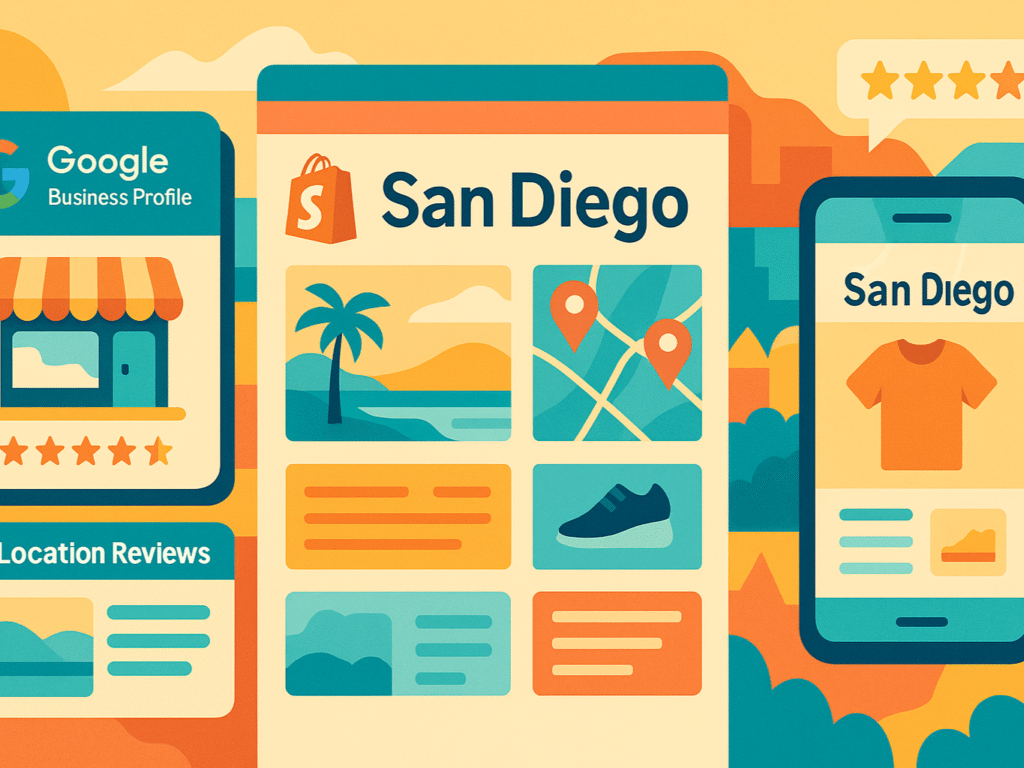
Implementing these eight Shopify SEO San Diego tactics can dramatically improve your store’s local visibility. Begin with your Google Business Profile, the cornerstone of local presence. Combine that with clever local keyword placement across product pages, blog posts, and meta descriptions to help search engines identify your geographical relevance.
Next, create location-specific landing pages and build backlinks from local San Diego directories to strengthen your store’s authority. Use structured data markup to provide search engines with detailed information about your business. These technical optimizations increase your chances of appearing in rich snippets and Google’s local search packs.
Customer reviews enhance trust and influence rankings, while mobile optimization ensures a smooth experience for over 60% of mobile users. Utilize Shopify SEO tools to monitor progress and refine your tactics. In a competitive market like San Diego, mastering these local SEO strategies will give your e-commerce store a lasting edge.
FAQ on Shopify SEO San Diego
1) What is the importance of optimizing your Google Business Profile?
Optimizing your Google Business Profile boosts local visibility, enhances credibility, and increases engagement. Accurate listings, updated hours, and positive reviews help customers find and trust your store. It’s a critical first step for appearing in local search results and driving both online and in-person traffic.
2) How do local keywords benefit Shopify SEO in San Diego?
Local keywords connect your store to shoppers in your area by matching the search terms people use in your vicinity. Using city or neighborhood names in titles, descriptions, and content improves relevance in Google’s eyes. Effective local keywords enhance your Shopify SEO strategy in San Diego, attracting high-intent buyers who are more likely to convert.
3) Why are location-specific landing pages crucial for local SEO?
Location-specific landing pages help Google understand precisely where your business operates. They allow you to tailor content for different areas, include map embeds or location-based testimonials, and improve visibility in “near me” searches. These pages also provide essential info to drive more qualified traffic and local trust.
4) How do customer reviews impact local search rankings?
Customer reviews tell search engines that your business is active, trusted, and relevant. Frequent, positive feedback improves ranking while integrating naturally searched phrases. More importantly, reviews build trust with potential buyers, influence purchasing decisions, and encourage higher engagement across your Shopify store and Google listings.


